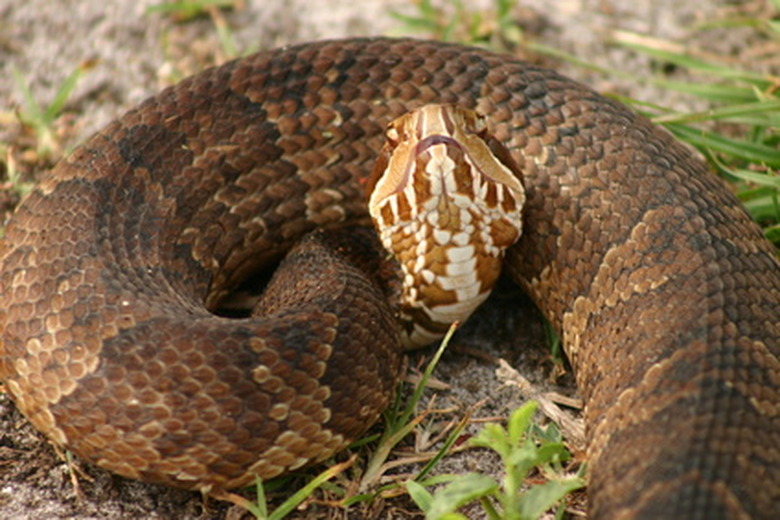What Is The Predator Of A Water Moccasin?
Cottonmouths or water moccasins are poisonous water snakes at the top of the food chain. They prey on other snakes, small animals, insects and large mammals. But on occasion, young cottonmouths are not immune to becoming the prey of other animals. Animals that prey on water moccasin include other species of the snake family, turtles, alligators, mammals, and birds. The greatest threat to the water moccasin, however, is human beings.
The cottonmouth or water moccasin is a venomous snake belonging to the pit viper snake family. Cottonmouths are found primarily in the eastern half of the United States, and as many as five subspecies have been reported. The nickname "water moccasin" stems from the fact that these snakes are semi-aquatic and known to silently sneak up on their prey making them feared poisonous water snakes. Interestingly, water moccasin are viviparous, meaning they give birth to live young rather than lay eggs.
Water moccasin predators
Water moccasin predators
Dogs, cats, raccoons, wild pigs, and other mammals occasionally prey on juvenile water moccasin, but the most common mammalian predator of a water moccasin is the opossum. Opossums are known for a rodent-like appearance and a fierce nature when it comes to killing their prey. Their immunity to the venom of the cottonmouth, quick speed, and the fact that they have more teeth than any other North American mammal all contribute to their status as predators of water moccasins.
Hawks and owls occasionally prey on young water moccasins, as do egrets. The sharp talon and beaks of these birds increase their chances of quickly killing a snake before it has the chance to strike. And they will try and strike. Unlike other non-venous water snakes, water moccasins typically stand their ground when threatened and open their mouths earning them the name cottonmouths.
Reptiles and other snake family members
Reptiles and other snake family members
Reptiles including alligators and snapping turtles frequently prey on young water moccasin. Just as cottonmouths occasionally prey on other species of snakes, some species of snakes, including king snakes and black snakes, occasionally prey on the water moccasin. Cottonmouths are also immune to their own venom and that of other cottonmouths and will prey on each other if other food sources are not readily available.
Greatest threat to poisonous water snakes
Greatest threat to poisonous water snakes
The greatest threat and most significant predator of the adult water moccasin is human beings. Water moccasin are venomous and are commonly found in swampy marshland in close proximity to towns and cities. Therefore, people often kill these snakes when they encounter them in order to prevent being bitten and to keep them away from their properties and homes.
Additionally, because water moccasins — like other cold-blooded animals — are naturally drawn to heat sources, they often bask on roads and highways, and many are inadvertently killed by motorists. Another factor contributing to the demise of this species is habitat loss and water drainage for development. Cotton mouths can migrate long distances in response to drought or reduced food supply — fragmentation of their roaming range is threatening the species' survival.
